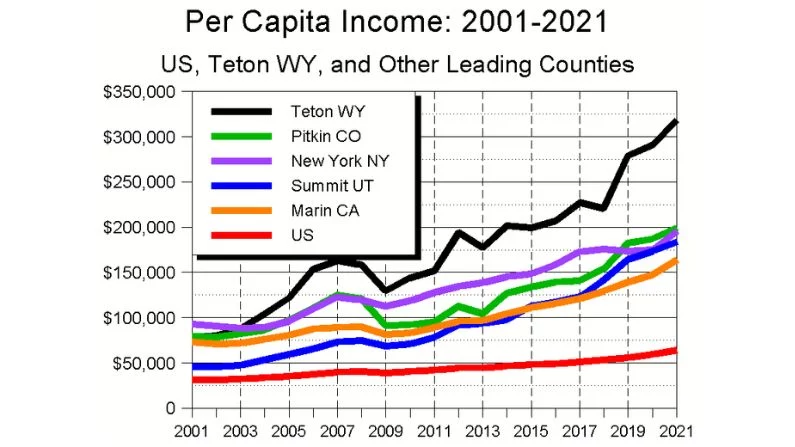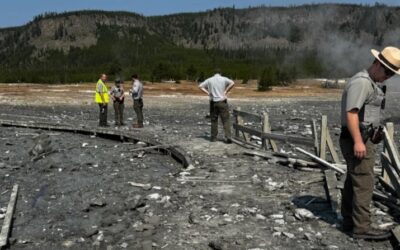Teton County tops charts nationwide with per capita income surpassing $300,000
Teton County again leads the nation in per capita income. Federal data shows that, in 2021, Teton County’s per capita income was $318,297 — the highest figure in the country. That’s a jump of nearly $100,000 from the year before, when Teton County also topped the charts.
Jackson Town Councilor Jonathan Schechter follows this kind of data closely in his CoThrive newsletter and said he was shocked by this year’s number. He attributes the increase to the amount of wealthy people moving to the county.
“The people who are being attracted to our community have high investment income as a rule of thumb,” Schechter said. “And they’re attracted here because Wyoming has such favorable tax and trust laws, so it’s a great place to shelter income.”
According to Schechter, Teton County’s tax haven status is what sets it apart from places like Pitkin County, Colorado, which is home to the famously wealthy enclave of Aspen. At almost $200,000, Pitkin County was the runner-up for highest per capita income. That number is still far above the average per capita income in the United States, which is about $65,000.
Schechter says young people and workers — as well as local homeowners facing high property taxes — are going to be the ones pushed out if the community doesn’t act quickly.
“As more and more wealth pours into the community, those folks are able to outbid, outcompete folks who are trying to earn their living by living here,” Schechter said. “So, that’s going to have profound effects on who’s able to live here, and the people who get squeezed are those people who are making less income.”
The county will get a bigger picture of these inequalities in mid-December, when the Internal Revenue Service releases tax return data from 2020.
Cheyenne Stewart steps into wildlife management coordinator role at Game & Fish

Before coming to Jackson, Cheyenne Stewart had served as Game & Fish’s wildlife management coordinator in Sheridan since 2019. (Wyoming Game & Fish Department)
Jackson has a new wildlife management coordinator at the Wyoming Game & Fish Department. Cheyenne Stewart moved to Jackson in November to oversee the department’s wildlife biologists after serving in the same position in Sheridan.
Stewart said that the reason she moved to Jackson is similar to most residents’ motivations:
“Big game, big landscapes and also big opportunities to figure out how we can live and thrive and have those populations live and thrive as well,” she said.
Stewart is no stranger to northwest Wyoming. She started her career with Game & Fish in 2014 researching elk in Pinedale. Before that, she studied wolves in Yellowstone National Park and mountain lions in western Colorado, among other endeavors.
Stewart takes over the Jackson position from Doug McWhirter, who retired this fall after spending 35 years managing wildlife populations and guiding land use decisions. In that time, McWhirter built a reputation as the state’s foremost bighorn sheep expert.
“I feel very fortunate to be able to come in behind someone like him, but definitely the pressure’s on to try and fill those shoes,” Stewart said.
Stewart will now oversee projects such as initiatives to monitor struggling mule deer populations.
Montana judge lifts wolf hunting restrictions as trapping season begins
A federal judge in Montana has restored the state’s wolf hunting regulations. Judge Christopher Abbott had previously issued a temporary order in mid-November restricting trapping and hunting, especially around Glacier and Yellowstone National Parks.
Wolves continue to be a controversial species in the Northern Rockies. Lawmakers in Idaho and Montana loosened restrictions last year to allow for more effective hunting methods.
Environmental groups were concerned too many animals could die this winter. They responded with lawsuits, many of which are still pending.
Judge Abbott decided that Montana’s wolf population is sustainable despite recent changes. There are currently 1,100 wolves in the state, and 329 wolves were killed last year.
This story comes through a content-sharing partnership with Wyoming Public Media.





